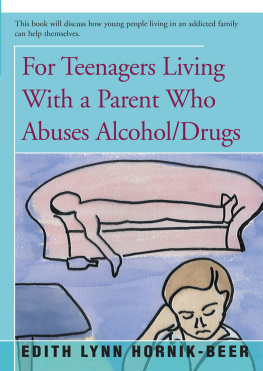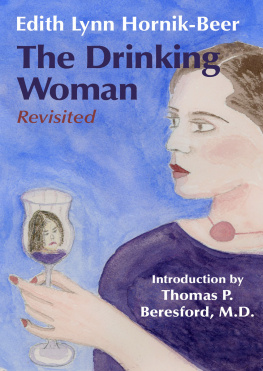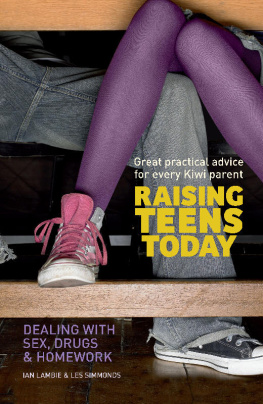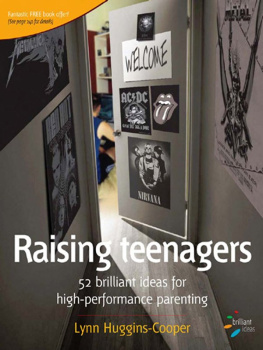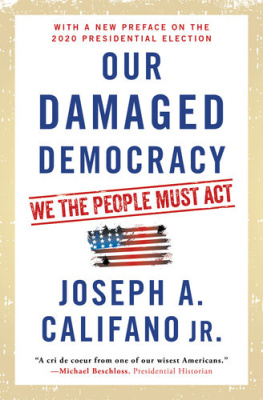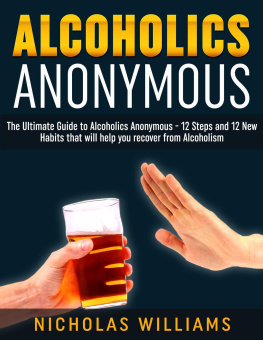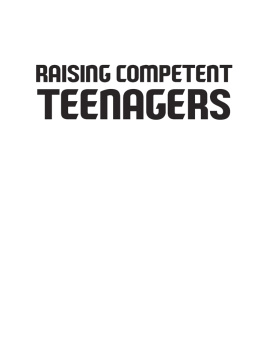For Teenagers Living With a Parent Who Abuses Alcohol/Drugs
Edith Lynn Hornik-Beer
The twelve steps are reprinted with permission of Alcoholics Anonymous World Services, Inc. (A.A.W.S.) Permission to reprint the Twelve Steps does not mean that A.A.W.S. has reviewed or approved the contents of this publication or that A.A.W.S. necessarily agrees with the views expressed herein. A.A. is a program of recovery from alcoholism onlyuse of the Twelve Steps in connection with programs and activities which are patterned after A.A., but which address other problems, or in any other non-A.A. context, does not imply otherwise.
Preface
For teenagers living With a Parent Who Abuses Alcohol/ Drugs is an updated version of the books You and Your Alcoholic Parent, first published in 1974 by Association Press, and A Teenagers Guide To Living With An Alcoholic Parent, published in 1984 by Hazelden Educational Material. The original book was written with the encouragement of the late Dr. Frank Seixas (at that time medical director of the National Council on Alcoholism). Because of the variety of substance abuse, NCA has since changed its name to National Council on Alcoholism and Drug Dependence Inc.
The purpose of this new book, For Teenagers Living With a Parent Who Abuses Alcohol/ Drugs, is to include all substance addictionsnot just alcohol. No matter whether a teenager lives with a parent who is an alcoholic, cocaine, crack, heroin, tranquilizer, or marijuana abuser or who suffers from cross addictions, the pain, the family trials, the hurt are still all there. This book will discuss how young people living in such a family can help themselves.
Edith Lynn Hornik-Beer
Introduction
This is a book for those of you who are living with a drug-dependent parent or parents. This includes alcoholism. You are well aware of the emotional impact your parents drug dependencies has on you and the perplexities, difficulties, and abuses you are faced with. You are probably seeking more information on how to manage your lives under such circumstances. You may wonder whom you can turn to and if they will understand the fear you live with at home. You worry whether your parent will be abusive. Will he or she pass out? Will your mother forget to turn off the stove when alone in the house? Will you face another lonely evening because your father sits in glum silence with his liquor bottle or his pills as his sole companion?
In writing this book it has been my object to define in realistic, concrete, and non-technical language the essential facts of alcoholism and other drug dependencies and what you, as a young person, experience under such circumstances.
For many years I have had the opportunity to teach creative writing and to write for teenagers. My writing led me to wherever young people might be: The Youth Consultation Services, teenage walk-in centers, Family Service, hospitals, Alateen, police headquarters, courts, and all kinds of schoolsprivate, parochial, and public.
Whenever a real problem came up, such as a teenager dropping out of school in despair or turning to hard drugs in anger and pain, too many of the cases could be traced to serious problems in the home. Those who came from drug-dependent homes showed signs of being abused, mistreated, and often neglected. They were subject to mental depression and had feelings of guilt and inferiority. All too many had not been helped to recognize that their immediate personal difficulties related to the parental addiction at home. These youngsters knew only that they had lost confidence in themselves, in the community, and in their parents. But once the source of the problem was discovered, they wanted more and more answers to what was going on in their home, and with the answers came a certain amount of relief from the disruption of their lives.
This book is a composite record of all those questions young people have asked in my presence and is based largely on their experiences with parental alcoholism, drug abuse, and cross addiction.
I have attempted with a question and answer format to get down to such practical problems as: How can I change the situation, or how can I help? How can the family get help? How do I bring a friend home when my parent is drunk? What do I do if my doped up parent hits me or insults me unfairly? No matter how upsetting these problems are to you personally, they all tie in with the fact that drug dependency is a disease: the substance abuser is a sick person, and you are affected by his or her illness.
Its important to know that you are not alone. The United States Public Health Service ranks drug abusealong with heart disease, cancer, and mental illnessas one of the great health problems in the country. There are separate statistics for each drugheroin, cocaine, marijuana, etc. For example, it is estimated that close to a million people need treatment for heroin addiction. About eleven million abuse marijuana. There are over ten million alcoholics in the United States. Think of itthere are enough alcoholics or marijuana users in the United States to form a small nation. Switzerland has a population of seven million and Denmark has five million.
If you count only the sons, daughters, husbands, and wives affected by living with alcoholics, plus the marijuana users, the number of those hurt multiplies into the eighty millions.
The answer to living with drug addiction, as it is to any other disease, is knowledge. It may bring you new hope, courage, and peacefulness.
Acknowledgments
The updating of the present book, For Teenagers Living With a Parent Who Abuses Alcohol/ Drugs, was done with the help of Sheila Blume, M.D., F.A.T.A., F.A.S.A.M. and former Director of New York State Division of Alcoholism and Alcohol Abuse, and Nicholas A. Pace, M.D., F.A.S.A.M. Among other honors, Dr. Pace is a Life Member of the National Council on Alcoholism and Drug Dependence, a Fellow of the American Society of Addiction Medicine and New York Academy of Medicine. He was adviser to First Lady Nancy Reagan for the Chemical People Project.
Others who went out of their way to help make this book possible are Melody J. Anderson, C.S.W., counselor/therapist and coordinator of Family Services at Hazelden New York; Naomi Weinstein, director of Children of Alcoholics Foundation, an affiliate of Phoenix House; Don Fass, executive director of Streetcats; Terry Paine, NCADD, Family Education Services Coordinator; Angela T. Zinzi, MSEd, Campus Outreach Coordinator, Children of Alcoholics Foundation; Brian Johnson of NCADD in Kansas City; Alfred Hellreich, M.D.,F.A.A.D., Joan Steingart, C.S.W.
Editors Note:
The pronouns have been alternated throughout the text in order to avoid the cumbersome use of he/she. This should in no way imply stereotyping of any behaviors to either sex.
Alcoholism and Other Substance Abuses
If alcohol is a drug why list it separately from other addictive drugs?
Alcohol can be obtained legally and without a prescription. Social drinkers or people who occasionally have one or two drinks are usually not affected adversely.
What is alcoholism?
Alcoholism is a disease of the body, mind and spirit. Alcoholics are as sick as people who have tuberculosis or diabetes. People who are alcoholics are excessive drinkers. They cannot always stop at one or two drinks. Most alcoholics start out with the same intentions as the nonalcoholic: to have no more than one or two drinks. The nonalcoholics, or so-called social drinkers, can stop when they choose. Alcoholics cannot. For alcoholics, drinking becomes a compulsion. They are victims of their own compulsion. They will drink to quiet their nerves, their unhappiness, or to avoid making an important decision.

